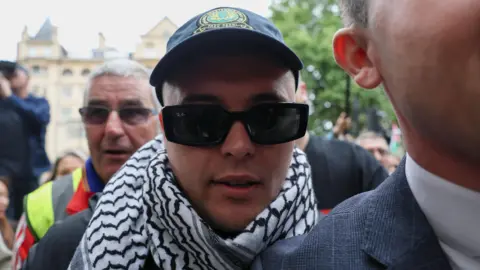In a notable turn of events, Liam Óg Ó hAnnaidh, a prominent member of the Irish rap group Kneecap, appeared in court at Westminster Magistrates’ Court in London facing serious allegations. He is being charged with the offense of displaying a flag supporting Hezbollah, an organization that is classified as proscribed in the United Kingdom, during a performance held in London last year. This charge has raised eyebrows not only due to its political implications but also because of the broader discussions it incites about freedom of expression and artistic freedom within the United Kingdom.
Ó hAnnaidh, who is known for performing under the stage name “Mo Chara,” arrived at the court surrounded by a throng of photographers, underscoring the media attention that this case has garnered. The artist, who is only 27 years old, categorically denies the charges brought against him. He contends that the allegations are politically motivated and aim to undermine the voice of Kneecap, a group famous for its explicit content that often stirs controversy.
Interestingly, the case against Ó hAnnaidh was launched after the Metropolitan Police reviewed video footage from the concert during which he allegedly displayed the flag. This act, which some may argue is a form of protest, has led to legal repercussions that could have significant implications for the group’s future and the broader discourse surrounding freedom of speech in the arts.
Support for the rapper has poured in, evident by the large crowd that gathered outside the court on the day of his hearing. Demonstrators held signs reading “Free Mo Chara,” signaling public backing for the artist while also waving flags symbolizing Palestine and Ireland. The atmosphere was electric, with fans expressing solidarity, particularly as the case unfolds in such a politically charged environment. Accompanying Ó hAnnaidh were fellow band members, Naoise Ó Cairealláin, known as Móglaí Bap, and DJ Próvaí, along with the band’s manager. Their presence highlights the unity and support that exists within the group in the face of adversity.
Municipal authorities were clearly vigilant regarding the potential for unrest during this gathering. On the evening preceding the court appearance, the Metropolitan Police implemented conditions under the Public Order Act aimed at maintaining order and preventing serious disruption from the protest in support of Ó hAnnaidh. They established guidelines indicating that any demonstrations in favor of the rapper needed to be confined to designated areas as the case prompted significant public interest.
Kneecap, the group from which Ó hAnnaidh hails, is an Irish-speaking rap trio founded in 2017. They have become well-known for their provocative lyrics and merchandise that frequently challenge societal norms and political boundaries. Their rise to fame has not only attracted attention in music circles but even led to the production of a semi-fictional film starring noted actor Michael Fassbender, which recently won a British Academy of Film Award (Bafta) in February 2025. Furthermore, the band has not shied away from addressing global issues; they faced backlash earlier in the year for their contentious remarks regarding the Gaza conflict during their performance at the prestigious Coachella music festival.
This event is representative of the ongoing struggles surrounding artistic expression in politically charged atmospheres. Kneecap’s growing visibility has not only highlighted their musical talents but has also raised critical discussions on the intersections of music, politics, and cultural identity, marking them as a significant force in today’s cultural landscape. Their legal battles, particularly surrounding the recent charges against Mo Chara, are a testament to the challenges faced by artists when their work intersects with sensitive political ideologies amid an increasing climate of scrutiny in the public eye. As this case progresses, it is expected to resonate beyond just the individuals involved, touching on broader themes of freedom of expression and the role of artists in society today.












